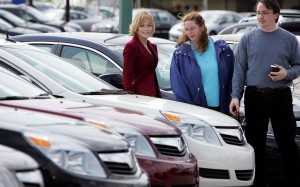
ALG, a subsidiary of TrueCar, updated its 2020 new vehicle sales forecast, calling for a major downshift in car sales in what it described as the longer-term economic slowdown as the economic wreckage from the COVID-19 hits home.
The forecast calls for a 14.2% decline in new vehicle sales, down 2.4 million units from ALG’s initial 2020 forecast and down 14.9% from 2019 sales to account for the quickly evolving coronavirus pandemic and the latest economic outlook.
ALG’s updated 2020 new vehicle sales forecast is based on projected the short-term and long-term impact of COVID-19. ALG also noted that in a quick recovery scenario, where the economy and auto industry recover by the end of April to pre-COVID-19 disruption levels, new vehicle sales will reach 16.4 million, down 500,000 vehicles or 2.9% from ALG’s initial 2020 forecast and down 3.8% from 2019 sales.
(UAW, Detroit automakers set up coronavirus task force.)
However, President Donald Trump said Monday that the best estimate of health experts is that the outbreak would abate in “July and August and recommend that Americans shelter in place, close schools and eliminate gatherings of 10 or more people and practices social distancing everywhere.”

At the same time, the stocks are continuing to plunge, layoffs are beginning to mount as service businesses and airlines shutdown and the economy seizes up.
Meanwhile, the automakers are beginning to react, putting in place major promotions. Ford Motor Co. said it was moving to help customers affected by the developing coronavirus outbreak.
“Ford is committed to lending a hand to the people who rely on us,” said Mark LaNeve, vice president, U.S. marketing, sales and service. “The peace of mind of our Ford and Lincoln customers is our top priority as we work through the developments of this outbreak.”
Ford said its existing Ford Credit customers in the U.S. affected by COVID-19 who purchased or are leasing vehicles are encouraged to contact Ford Credit to discuss options if they are having payment difficulty. For example, they may be able to change a payment due date or delay a payment.
(Fever pitch: Coronavirus pandemic taking increasing toll on auto industry.)
General Motors is looking to cushion the blow, both for current owners and prospective buyers. The automaker has rolled out zero-interest loans for up to 84 months for customers in top credit tiers. GM said it will also work with current owners feeling financial effects of the pandemic.

Hyundai Motor America is reinstating its Assurance Job Loss Protection program to support customers affected by the uncertain business and financial environment created by the coronavirus pandemic.
Hyundai will make up to six months of payments for new owners who lose their jobs and have purchased or leased their vehicle between March 14 to April 30, 2020, through Hyundai Capital. Additionally, for select new purchases through April 30 financed by Hyundai Capital, Hyundai is deferring payments for 90 days at the customer’s request.
“We understand the extreme uncertainty created by the coronavirus and the anxiety experienced by our customers, and wanted to tap into Hyundai’s legacy of having people’s back,” said José Muñoz, chief operating officer, Hyundai Motor Co.; president and CEO, Hyundai Motor North America.
ALG said it believe it’s prudent to provide a revised range of auto industry projections to new vehicle sales for 2020. “The range is based on various scenarios provided by expert third party forecasts of macro-economic impacts from the Coronavirus outbreak,” said Eric Lyman, chief industry analyst for ALG, a subsidiary of TrueCar.

“A quick recovery by the end of April would lead to roughly half a million lost sales, while a prolonged slow down through the end of the year would result in a nearly 15% year-over-year sales decline in 2020. While forecasts are changing day to day, our current likely scenario has new vehicle sales for 2020 landing in the mid 15M unit range,” Lyman said.
(U.S. auto sales may fall off due to coronavirus.)
COVID-19 will have impacts on both vehicle inventory availability and consumer confidence, affecting supply and demand and COVID-19 will have immediate short term impacts due to reduced income and reduced commerce in general.







